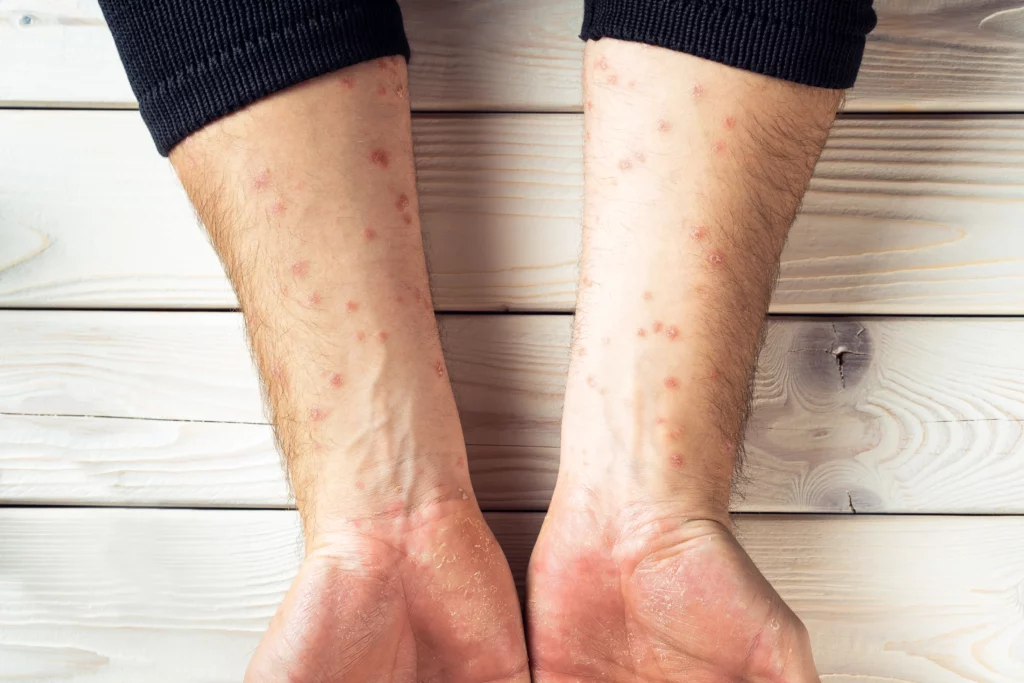
Vitamin D is completely different than most other vitamins. It’s a steroid hormone produced from cholesterol when the sun hits your skin. For this reason, vitamin D is considered “the sunshine vitamin.”
Vitamin D has multiple functions, including immunomodulatory, anti-inflammatory, antioxidant, and antifibrotic actions. Despite this, sun exposure alone is often insufficient to provide adequate levels of Vitamin D for the body. Therefore, it's necessary to obtain Vitamin D through dietary supplements or food sources.
There is no cure for psoriasis, but treatments can help manage symptoms, such as topical creams and ointments, light therapy, oral medications, or biologics that target specific parts of the immune system.
One such treatment option that has gained attention in recent years is Vitamin D. Recent research has suggested that there may be a link between Vitamin D deficiency and psoriasis.
What’s so good about that vitamin D? It helps bone health and immune function and regulates cell growth and differentiation.
While the research is ongoing, the potential benefits of Vitamin D for people with psoriasis are promising.
Vitamin D is a fat-soluble vitamin that helps the body absorb calcium and phosphorus from food - essential minerals for building strong bones and teeth.
The two primary sources of Vitamin D are sunlight exposure and dietary intake.
Sunlight triggers the synthesis of Vitamin D in the body's natural source, the epidermis. Which then gets stored in the liver and fatty tissues for later use.
Once in the body, Vitamin D goes through several processes before becoming active.
First, the liver converts it into a pre-hormone called calcidiol. Then, it goes through a kidney conversion to become calcitriol - an active hormone that can interact with cells throughout the body.
Calcitriol helps regulate calcium levels in the blood by promoting its absorption from food or bones - if needed.
However, it's worth noting that getting too much Vitamin D can also be harmful - so it's important to talk to your doctor about how much you need based on your health status and lifestyle factors like sun exposure or dietary habits.
There are two main types of Vitamin D:
D3 (cholecalciferol) are almost twice as effective at increasing blood levels of vitamin C as D2 (ergocalciferol).
Are you new to skincare? Learn the ABCs of Skin Nutrition!

Psoriasis is a condition where there is an overgrowth of epidermal keratinocytes in the skin, thus leading to the formation of lesions. These lesions present inflammation caused by immune cell infiltration in the dermis and epidermis skin layers.
This reaction leads to thick, scaly patches on the skin's surface. The patches can be red, itchy, and painful; on areas like the elbows, knees, scalp, and lower back.
There are several types of psoriasis including,
Each type has unique symptoms and characteristics, but skin inflammation and abnormal cell growth are constant.
The exact cause of psoriasis is not yet fully understood, but researchers believe that genetic and environmental factors may play a role in its development.
Some people with a family history of psoriasis are more likely to develop it themselves.
Furthermore, some triggers, such as stress, infections, or injuries to the skin, may exacerbate psoriasis symptoms. Other risk factors for developing psoriasis include obesity, smoking, and excessive alcohol consumption.

Vitamin D poses immunomodulatory effects that offer opportunities to improve several autoimmune diseases, such as psoriasis. Therefore, topical vitamin D is a therapeutic option
due to its action on the proliferation and maturation of keratinocytes.
However, in the case of oral vitamin D intake in psoriasis, it is an adjunctive treatment option still discussed for patients.
Vitamin D also impacts the growth and differentiation of skin cells. It helps to regulate the production of keratinocytes, the cells that make up the outer layer of the skin. When the body doesn't get enough Vitamin D, it can lead to abnormal keratinocyte growth and differentiation, which can contribute to the development of psoriasis.
While more research is needed to understand the relationship between Vitamin D and psoriasis management, current evidence suggests that topical Vitamin D may help reduce inflammation and improve symptoms associated with this chronic skin condition.
The use of vitamin D can help psoriasis patients. Nonetheless, damaging effects can emerge from improper administration. In both scenarios, too much vitamin D can trigger health risks.
Unprotected exposure to sunlight can lead to sunburns and skin cancer, not to mention the internal damage the sun can provoke.
And stocking without care supplementations can lead to high levels of calcium in the blood that unchains a failure in bodily functions. On their own, vitamin D treatments often won’t be effective in the long run. Most notably, vitamin D isn’t for everyone, regardless of the form taken.
Want to alleviate the discomfort? Read to accommodate some lifestyle changes that may help the severity of psoriasis:
Diet: Eating foods rich in antioxidants (fruits, vegetables, whole grains, and lean proteins) may help reduce inflammation. Avoiding trigger foods such as processed foods, alcohol, and red meat may be helpful.
Stress management techniques: Practicing yoga or meditation can be beneficial for reducing stress levels and improving overall well-being.
Exercise: Regular exercise improves physical and mental health. Staying active reduces inflammation in the body while promoting weight loss which can lessen the strain on joints.
Avoid smoking: Smoking increases the risk of developing psoriasis and worsens symptoms. Quitting smoking can significantly improve overall health outcomes.
Moisturize: Keeping the skin moisturized is crucial for individuals with psoriasis since it helps to reduce itching and dryness associated with this condition.
Maintaining healthy lifestyle habits can go a long way toward managing psoriasis symptoms. However, don’t skip consulting your healthcare provider before making significant changes to your lifestyle or treatment plan - as everyone's needs are unique.
Vitamin D plays a crucial role in the immune system, and research suggests that it may have anti-inflammatory properties that can improve psoriasis symptoms.
While there is no definite solution for psoriasis, maintaining a healthy diet and lifestyle can go a long way toward managing its symptoms effectively.
Vitamin D plays a crucial role in the immune system, and research suggests that it may have anti-inflammatory properties that can improve psoriasis symptoms.
Consulting with a healthcare professional is vital when managing this condition so they can provide personalized guidance on treatment options and lifestyle modifications based on individual needs.
Read more about skincare and health in our blog.
2+ Topicals offers skincare that promotes health through an effective delivery of topical supplements system. The formulations contain natural science and validated ingredients of the best quality.